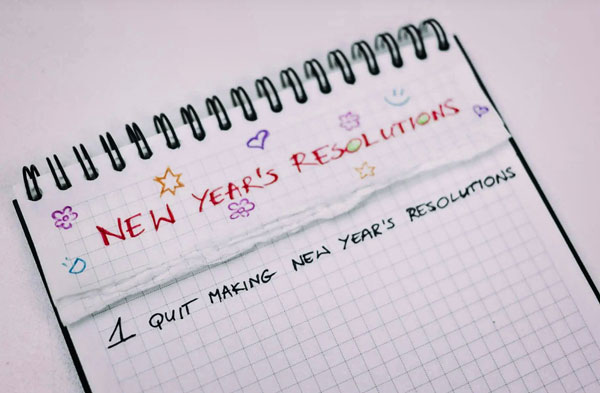Alternatives to New Year’s resolutions

Studies show New Year’s resolutions do not work. Instead of a resolution, why not try an alternative to a resolution?
Wanting to lose weight in 2024? Write that book? Organize the pantry? It is well-reported that a whopping 80% of New Year’s resolutions are unsuccessful by mid-February. According to a study by researchers at the University of Scranton, most people abandon resolutions by the middle of January. In short, resolutions do not always work.
Most fail due to their vague nature or lack of an actionable plan. Some can be unrealistic or overwhelming.
There are many other achievable alternatives to New Year’s resolutions. Here are a few ideas to try:
Think big. Mel Robbins, motivational speaker and author, says to think bigger than one year. Robbins attributes part of her success to focusing on one aspirational goal and focusing on studying that for as long as needed. She says to think in terms of a decade. For more information, visit melrobbins.com.
Map out monthly themes. If working in shorter time frames sounds more appealing, choose a theme for each month of the year. Throughout the year, create ways to contribute toward that theme.
Track it down. Do you like numbers, graphs or a little accountability? Think about something that would be interesting to keep track of or measure. Some ideas could be a time log to track how much time is spent on different activities (like social media or TV) or a money log or app to see where it all goes. What you do with this information is up to you, but it could lead to some important realizations and possibly positive changes.
Get SMART. If specific goals are important to realize, success is more likely with a SMART goal. Have a goal that is Specific, Measurable, Achievable, Realistic and anchored within a Time frame.
Have a life list. Write down the ultimate life list and work on stepping closer to one or two of the items. Do the research and create the path toward that dream. The anticipation and planning will surely lead to a greater possibility of making a goal a reality.
Rise to the challenge. Like competition? Find a 30, 60 or 90-day challenge that is of interest. With a 30-day challenge, it is easier to stay motivated and focused and see actual results in a relatively short amount of time. Join forces with others to stay accountable to each other. Or, or even better, meet in person regularly to meet the goals of the challenge. For ideas for 30-day challenges, go to developgoodhabits.com/30-day-challenge-ideas/.
Be grateful. Robert Emmons, the world’s leading scientific expert on gratitude, had astonishing results when studying the benefits of practicing gratitude – including physical, psychological and social benefits. Visit mindful.org and search for ways to practice gratitude in 2024.
By Lisa Nicklanovich; courtesy photo